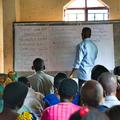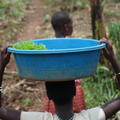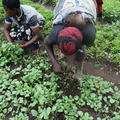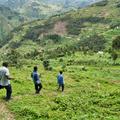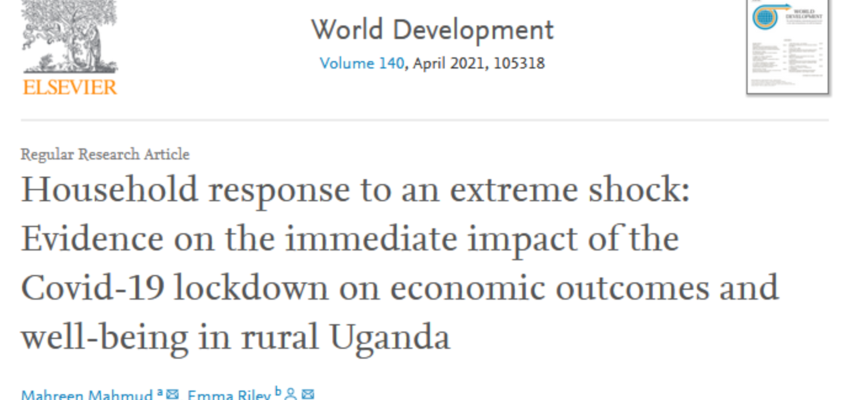UNDERSTANDING THE IMPACT OF COVID-19 ON ECONOMICS OUTCOMES AND WELL-BEING OF RURAL COMMUNITIES IN WESTERN UGANDA
OUR AIMS
This project analyses the economic impact of the Covid-19 crisis on vulnerable, rural households in a developing country already suffering from high levels of poverty.
Immediately before the lockdown (25 March 2020 - 26 May 2020, with full restrictions being lifted on 27 July 2020) due to Covid-19, the research team conducted a survey of 1300 households randomly selected from 120 villages in rural areas of Western Uganda. This recently collected data on consumption, income, employment, health status and relationship quality, as well as contact numbers, from very remote parts of the country, made the team ideally placed to understand the impact of the crisis on a vulnerable population.
ABOUT THE PROJECT
This project uses high-frequency phone surveys to track the impact of the Covid-19 crisis on the economic situation of vulnerable, rural households over three months, enabling researchers to descriptively understand the economic impact of the crisis on poor, rural communities.
The households are taken from a sample from 120 villages in Kyenjojo and Kagadi districts of Western Uganda. These villages were chosen in collaboration with the district government as particularly isolated and disadvantaged villages with limited access to government services. The households in the sample are therefore a representative selection of households from these villages and will enable the team to gain a clear idea of the economic impact on the entire distribution during the covid-19 crisis in rural Ugandan communities.
Working with the NGO Raising the Village (RTV), researchers conducted the phone surveys every two weeks with a sample of 1300 households in 120 villages of Western Uganda to understand:
- changes in expenditure (e.g. lower food consumption due to price rises and decline in incomes);
- changes in income (particularly casual labour and non-farm enterprises);
- shock coping strategies (e.g. needing to sell livestock or assets);
- and changes in health status and access to health care, as well as effects on mental health and relationship quality of couples.
This survey data enables researchers to see the complete time path of the impact of the crisis on these households’ economic situation as compared to the baseline survey, conducted immediately before the lockdown, both in the short term in the form of current income and consumption but also over the long term through the selling-off of assets and a decline in health.
Additionally, the team analyse effects on particularly vulnerable households, including female-headed households and those featuring elderly members, speaking to intra-household impacts of the crisis by seeing whether there are increased domestic disputes, potentially adding to the negative impact on women.
RESULTS
Findings highlights:
- Compared to immediately before the lockdown , household income falls by 60%, with enterprise and wage income heavily hit.
- Households respond by purchasing 50% less food per capita.
- Households draw down their savings and increase borrowing, but have not yet sold fixed assets.
- Households increase their labour supply overall, with increases in labour supplied to the farm and livestock exceeding the decline in labour supplied to enterprises and wage labour.
- Well-being declines: 50% increase in the likelihood of missing a meal and 25% decline in reported life satisfaction.
The research team find a large decline of 60% in household non-farm income due to household enterprise profits and labour income being almost wiped out post lockdown. Households respond to this loss of income in three key ways:
- there is a 40% decrease in food expenditure per adult equivalent;
- Households use up nearly 50% of their savings and borrow more but have not yet liquidated their fixed assets or sold livestock;
- Households increase total household labour supply to household farm and livestock, more than making up for the decline in supply to enterprises and labour outside the household.
The team find a decrease in well-being as a result of this: there is an increase in the likelihood of missing a meal, a decline in reported satisfaction with quality of life, a higher likelihood of having a major argument with their spouse and an increase in perceived frequency of intimate partner violence against women in the village. The negative effects of the lockdown are greater for households that were wealthier at baseline, since these households were more reliant on enterprise and salaried income. These results were one of the first to show a large negative impact of the lockdown for a rural population. These findings are important to policy makers in Uganda and other developing countries as they suggest income and consumption support is needed for rural households.
Findings from the first phone survey round can be read in the paper ‘Household response to an extreme shock: Evidence on the immediate impact of the Covid-19 lockdown on economic outcomes and well-being in rural Uganda’ in the World Development Journal. Finding from the subsequent phone survey rounds “Adapting to an aggregate shock: The impact of the Covid-19 crisis on rural households” are published in the Review of Economics of the Household.
PROJECT DETAILS
Timeline
May 2020 - August 2020
Location
Uganda

Theme
Firms, Farms and Labour
Welfare and Behaviour
Associations




